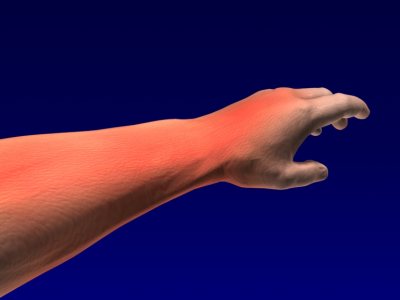

MedFriendly®


Allodynia
Allodynia is a condition in which something
that does not ordinarily cause pain actually
does cause pain. An example would be
feeling pain when touched lightly by a cotton
T-shirt or slightly cold water. When alloydynia
occurs in response to mildly hot or cold
temperature sensations it is known as thermal
allodynia. When it occurs in response to
physical stimulation, it is known as tactile
allodynia or mechanical allodynia. In dynamic
mechanical allodynia there is pain in
response to brushing.
In static mechanical allodynia, there is pain in response to light touch/pressure.
Abnormal functioning of pain receptors (known as nocireceptors) causes allodynia.
Another cause of allodynia is sensitization, in which repeated stimulation of nerve
endings causes those nerve endings to increase their responsiveness.
FEATURED BOOK: Eight Steps to a Pain-Free Back
Allodynia is a feature of pain syndromes such as migraines, nerve damage, and
fibromyalgia. Fibromyalgia is a condition characterized by chronic (long-term) pain and
tenderness in the muscles and bones, stiffness, fatigue, spasms, and severe sleep
difficulties.
"Where Medical Information is Easy to Understand"™
Allodynia can also be caused by nerve damage from the varicella
zoster virus (a type of herpes virus). It can also be caused by
complex regional pain syndrome, which is a chronic worsening
disease that causes severe pain, skin changes, and swelling.
Allodynia can also be caused by some types of stem cells used to
treat nerve damage such as spinal cord injury.
Stem cells are cells that have the ability to divide indefinitely and turn
into a number of different specialized cells. There are numerous
medications used to treat different forms of allodynia. Allodynia is
different from hyperalgesia which is excessive sensitivity to painful
stimuli.

Allodynia is associated with dysesthesia. Dysesthesia is pain or an uncomfortable sensation(s) after
being touched by an ordinary stimulus or even in the absence of stimulation. Allodynia comes from the
Greek word "allos" meaning "other," and the Greek word "odyne" meaning "pain." Put the words together
and you get "other pain."















